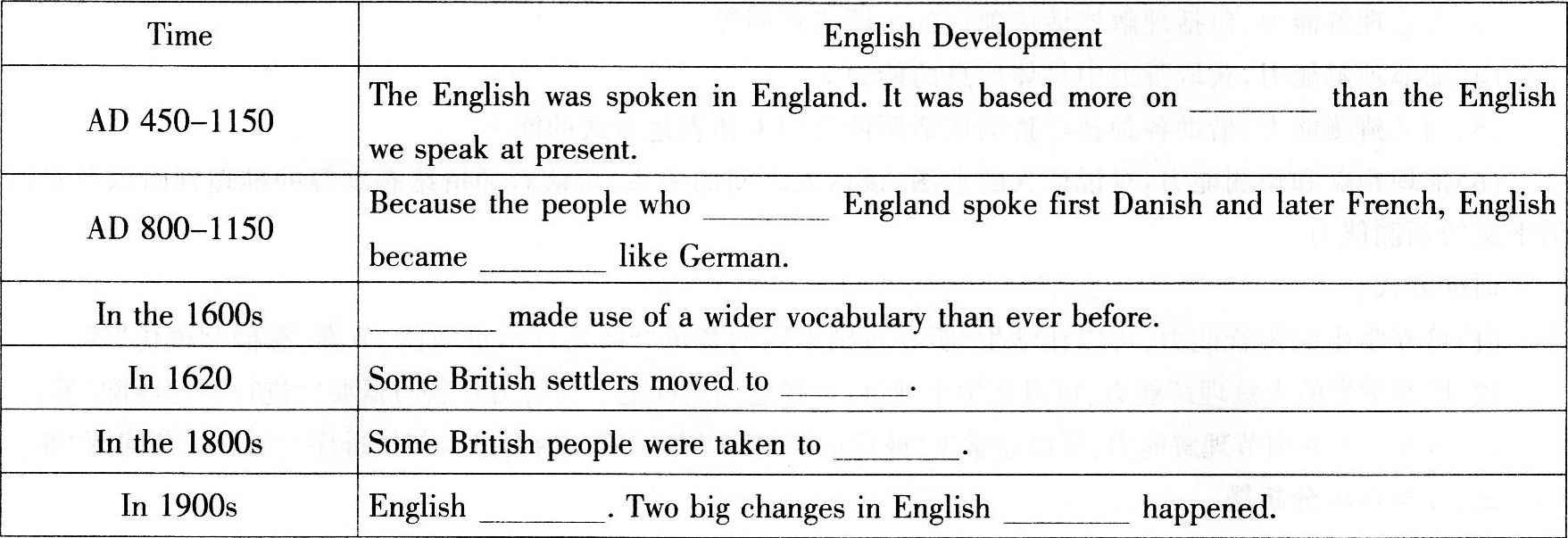| 第 1 页:模拟试卷 |
| 第 5 页:答案及解析 |
二、简答题
31.【参考答案】
采用演绎法教授语法,教师首先直接讲解语法规则并举例说明,然后让学生进行各种替换练习、句子练习等训练。这种教学方式讲解清楚,易于理解。比较适合具有强烈学习动机的学习者。但是在这种方式下,学生对教师的依赖性比较强,学到的语言知识也容易遗忘。演绎法注重形式而非使用,学生处于被动学习的状态。采用归纳法教授语法.教师让学生首先接触含有语法规则的语境.然后根据上下文的信息归纳出语法规则。这种方法可以增加学生和语言的接触,有助于激发学生的参与。使学生理解语法所适用的语境、所表达的含义以及所承载的功能,分析归纳总结语言使用规律,深化学生对用法的理解,有助于学生分析能力和注意力的培养。但是使用归纳法教授语法,对学生和教师的要求都很高,学生必须能够主动学习,愿意动脑筋,否则会对规则的印象不深.难以巩固。
三、教学情境分析题
32.【参考答案】
(1)该学生犯了13语语法错误,用错了动词过去式的形式。即My mum buyed the dress for me.buyed→bought,She buyed it in town.buyed→bought。
(2)该教师采用了重述法(Recasts)来纠正学生的错误。教师对学生语言表达中的错误进行了含蓄纠正。即先进行部分肯定之后用正确的语言重述学生的表达,不指出错误,而通过不同的语气(如反问)、语调、眼神、动作等,让学生自己意识到自己的错误。此纠错技巧对于纠正学生口语中的语法错误比较有效。
(3)①直接纠错法(Explicit Correction)
当学生出现语言错误时,教师打断语言训练或实践活动,对其错误予以正面纠正(说出正确的语言形式。并让学生改正)。这种纠错方式常用于旨在让学生掌握正确的语言形式而进行的机械操练或侧重语言精确输出的各种练习中。教师可用以下课堂用语:You should say…/No,you shouldn’t say that…/Read after me./Pay attention
to…/Oh,you mean…,We don’t say…in English,we say…等,例如:
T:What did you do last night?
S:I go to see a movie with my parents.
T:Oh.You should say“I went to see a movie with my parents”.
S:Oh.sorry.1 went to see a movie with my parents.
②强调纠错法(Pinpointing)
教师重复学生的话.有意重读并拖长出错部分的发音或用升调以表示特别强调。这种方法常用于学生的自我纠错。这样既能纠正学生的口语错误,保证学生顺利进行口头叙述,又能顾及学生的自尊心,促进他们参与口语活动的积极性。例如:
T:Where did you go on vacation this summer?
S:I go to Hong Kong for my vacation.
T:You go to Hong Kong?
S:Oh.1 went to Hong Kong for my vacation.
③重复纠错法(Repetition)
教师发现学生的语言错误后,可以要求学生重新回答,并使用“Once more./Pardon?/Repeat please."等对学生加以引导。例如:
S:Xiao Liu is watch TV.
T:He is watch TV?Pardon?
S:Xiao Liu is watching TV.
T:Right!Go on please.
教师在纠正学生的口语错误时,不应仅限于一种纠错方法。在选择纠错的方式上,应综合考虑教学效果,学习者的语言水平、性格特点以及情感因素,做到多种纠错方法灵活运用。除以上几种方法外,还有追问法、等待法、反馈法等多种纠错法。
总之.在英语课堂上教师应对学生口语错误的严重程度以及产生错误的原因认真进行分析,充分把握好纠错的时机,采取灵活多样的纠错策略,帮助学生克服因出现错误而造成的语言障碍,发展自我纠错能力,提高口语水平。
四、教学设计题
33.【参考设计】
Class Type: Reading class
Teaching Contents: The Road to Modern English
Teaching Objectives:
(1) Knowledge objective
Students can learn the development of English and the reasons that English has changed over time.
(2) Ability objective
Students can master predict the content of the text according to the tide and improve their reading abilities through the process of skimming and scanning.
(3) Emotional objective
Students can have a deeper impression of the popularity of English, realize the importance of learning English and have a higher motivation to learn it.
Teaching Key and Difficult Points:
How to make students predict before reading, get the general idea and the specific information while reading.
Major Steps:
Step 1 Pre-reading (6 minutes)
Activity 1 Guessing game
The teacher asks students to guess the meanings of the sentences which are written in old English.
As fair art thou, my bonnie lass,
So deep in luve am I;
And I will luve thee still, my dear,
Till a' the seas gang dry.
Then the teacher explains the background knowledge of the sentences.
(Justification: The guessing game can arouse students' interest in the topic and activate the class attnosphere.
Students will realize that the old English is different from modern English when talking about the meaning of these sentences written in old English, which will get them mentally prepared for the reading comprehension.)
Activity 2 Prediction
Ask students to make a prediction according to the title of the text.
(Justification: Students' predictions will get their mind closer to the theme of the text to be read and make their reading more intriguing and purposeful.)
Step 2 While-reading (12 minutes)
Activity I Skimming
The teacher asks students to read the text, check if they have made the right predictions and try to match the general idea of each paragraph.
Choose one or two groups to show their understanding, give comments and make a summary:
Paragraph 1Many people all over the world speak English.
Paragraph 2Why has English changed over time?
Paragraph 3English is now spoken in South Asia.
Paragraph 4Native speakers can understand each other even if they don' t speak the same kind of English.
Paragraph 5Finally by the 19th centurythe language was settled.
Then the teacher checks the answers.
(Justification: This step will help students confirm or reject their predictions and get the main idea of the text.)
Activity 2 Filling in the blanks
The teacher asks students listen to the recording of the text, underline the phrases that have something to do with the time and then fill in the form.

Then the teacher checks the answers.
(Justification: In the process of filling the form, students' reading skill of scanning for the detailed information will be improved, and it will help student understand the text logically.)
Step 3 Post-reading (7 minutes)
Activity 1 Retelling
T: Suppose you are an English teacher, and you have to give a brief introduction of the development of modern English to your students.
Then the teacher asks one of them to show his/her retelling.
Activity 2 Group discussion
The teacher lets students discuss the question why has English changed over time in groups and asks some of them to share their opinions in class.(The answers may vary. But it doesn't matter what their answers may be. The most important thing is to encourage them to express their own thoughts.)
The teacher then makes a summary and emphasizes the importance of learning English.
(Justification: Retelling will make students have a better understanding of the text, and the group discussion will encourage them to express their opinions freely.)
相关推荐:
2016教师资格《中学教育知识》提分卷 | 《中学教育知识能力》各类试题 ![]()
2016教师资格《中学综合素质》模拟卷 ![]() |《中学教育知识与能力》模拟卷
|《中学教育知识与能力》模拟卷
·2018下半年教师资格证《各科目》冲刺习题汇总 (2018-11-02 7:50:15)
·2018下半年教师资格证《各科目》冲刺习题汇总 (2018-11-02 7:50:00)
·2018教师资格证《幼儿综合素质》冲刺习题(2) (2018-11-02 9:32:00)
·2018教师资格证《幼儿综合素质》冲刺习题(1) (2018-11-02 9:30:00)
·2018教师资格证《幼儿保教知识》冲刺习题(4) (2018-11-02 9:38:00)
·免费真题 ·模考试题


实用文档 | 入党资料 | 入党申请书 | 入党志愿书 | 个人自传 | 转正申请书 | 思想汇报 | 个人简历 | 简历模板 | 简历封面 | 工作计划 | 工作总结 | 自我评测
个性评测 | 社交评测 | 事业评测 | 运势评测 | 报告 | 实习报告 | 工作总结 | 社会实践 | 心得体会 | 述职报告 | 调查报告 | 辞职报告
法律文书 | 合同范本 | 演讲范文 | 更多>>
英语学习 | 听力口语 | 阅读写作 | 翻译文化 | 趣味英语 | 学习方法 | 英文经典歌曲 | 每日课堂 | 空中英语 | 少儿英语 | 影视英语 | 英文歌曲 | 更多>>
作文大全 | 作文 | 小学 | 初中 | 高中 | 话题作文 | 考研 | 四六级 趣味作文 | 体裁作文 | 记叙文 | 议论文 说明文 | 应用文 | 读后感 | 作文素材 | 名言警句
优美段落 | 哲理故事 | 诗词赏析 | 成语知识 | 技巧 | 写作指导 | 作文点评 | 佳文赏析 | 写作基础 | 话题演练 | 作文教学 | 更多>>



